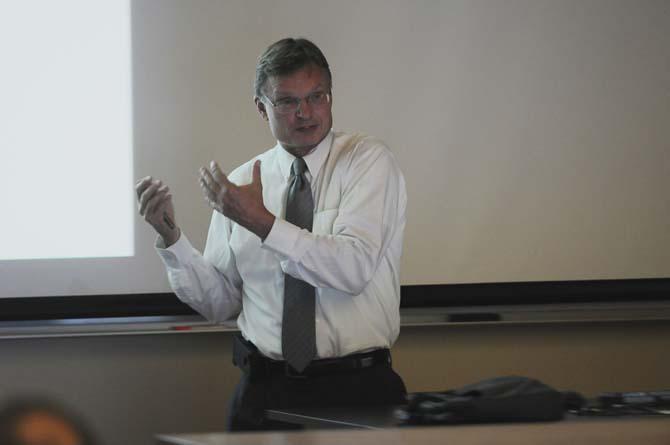More than 150 people gathered on Thursday and Friday to celebrate the legacy of the late University chemistry professor Philip West in a lecture series held in the Life Sciences Annex and the Howe-Russell
Geoscience Complex.
West was the first chemist to earn the rank of System Boyd Professor, the highest academic achievement at the University. He published more than 120 articles during his career and is remembered for his unyielding commitment to scientific discovery.
According to Pamela Brady, who organized the event, students in the analytical chemistry department compiled a list of prominent chemists who represented West’s ideals and voted for those whom they wanted to speak at the annual talk.
This year’s lectures were presented by Daniel Armstrong of the University of Texas at Arlington.
Brady said that every year the winners are awarded with plaques and host informal meet-and-greets after their presentations.
Sandy Dasgupta, West’s last graduate student, described West as one of the brightest people he has ever known, and encouraged Armstrong, his colleague, to accept the University’s invitation.
Armstrong, who has published 550 articles to scientific journals and patented 23 inventions during his career, said he was honored to receive the plaque and referred to West as a wonderful and eminent professor.
Armstrong’s research is highly praised, and he has received several awards from the American Chemical Society. He rose to particular prominence in 2012 for his publications on performance enhancing drugs and chemical analysis, which were the focus of his talks.
According to Armstrong, the attorney of two professional sprinters approached him in 2011 and asked him to run tests on supplements that made their urine test positive for the presence of synthetic drugs. The supplements’ manufacturers claimed the drugs were produced naturally, but Armstrong used devices of his own invention to reveal a more sinister truth.
“We found Diethylamine, a stimulant that’s a lot like the street drug speed,”
Armstrong said.
The sprinters used this evidence to sue the supplements’ manufacturers, and in April 2012, the Food and Drug Administration banned Diethylamine, or DMAA, from use as a dietary supplement. Armstrong said that prior to the ban, DMAA could be found in many products sold at retail chains like GNC and The Vitamin Shoppe.
Today, the tools Armstrong built to detect the drug are commercially available and used to conduct a variety of research. In his talk on chemical analysis, Armstrong said they are used to measure water contaminants, pharmaceutical content and atmospheric pollutants.
“People come up for uses for these things I’ve never thought of, and I feel good because they were used to create something significant,” Armstrong said.
Armstrong said he appreciated his time at the University and was glad he was invited to give the talks. Brady said the audience felt the same way, and the event will return next spring for its fourth anniversary.
“We found Diethylamine, a stimulant that’s a lot like the street drug speed.”
Lecture series honors late chemist
By Panya Kroun
February 2, 2014
University of Texas at Arlington Biochemist Daniel Armstrong gives a speech on Ionic Liquids in Separations and Mass Spectrometry Friday, Jan. 31, 2014 at the LSU Life Science biulding.





